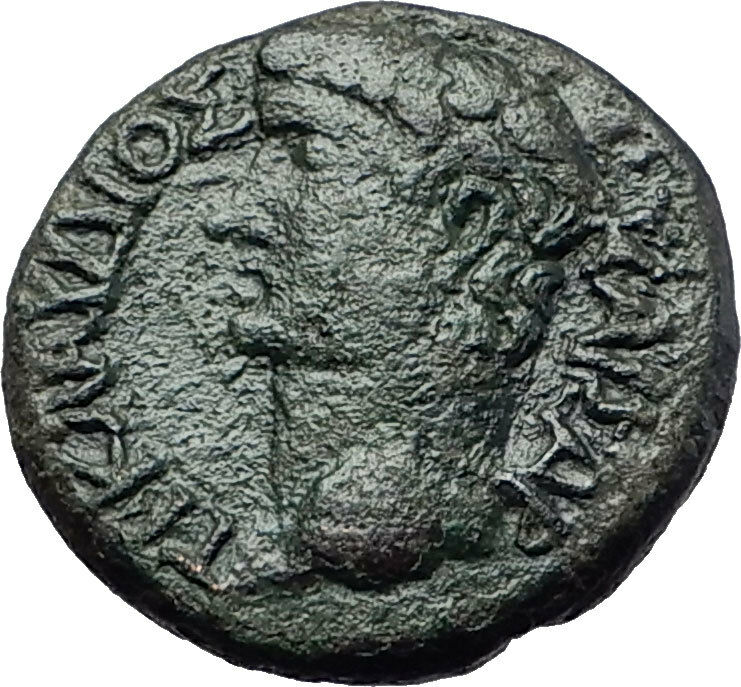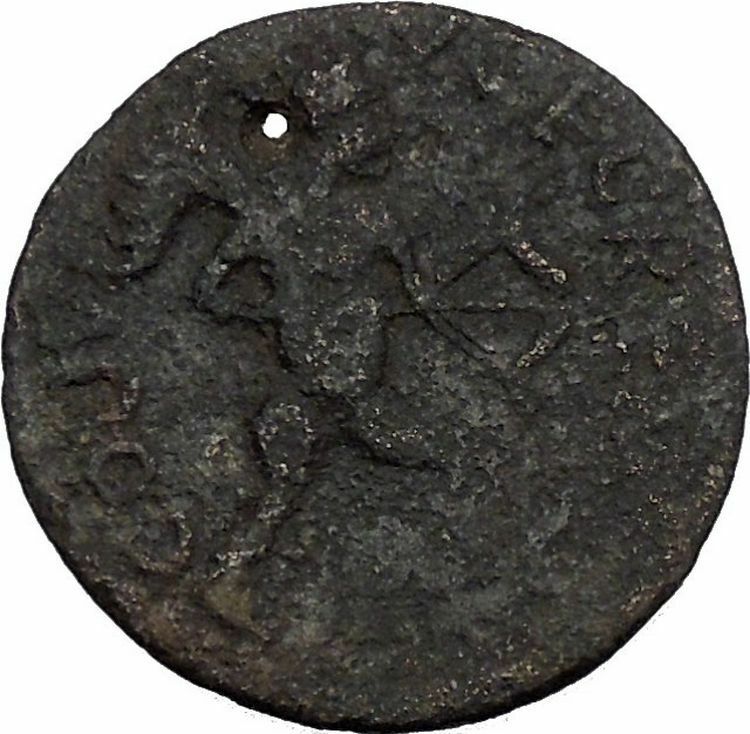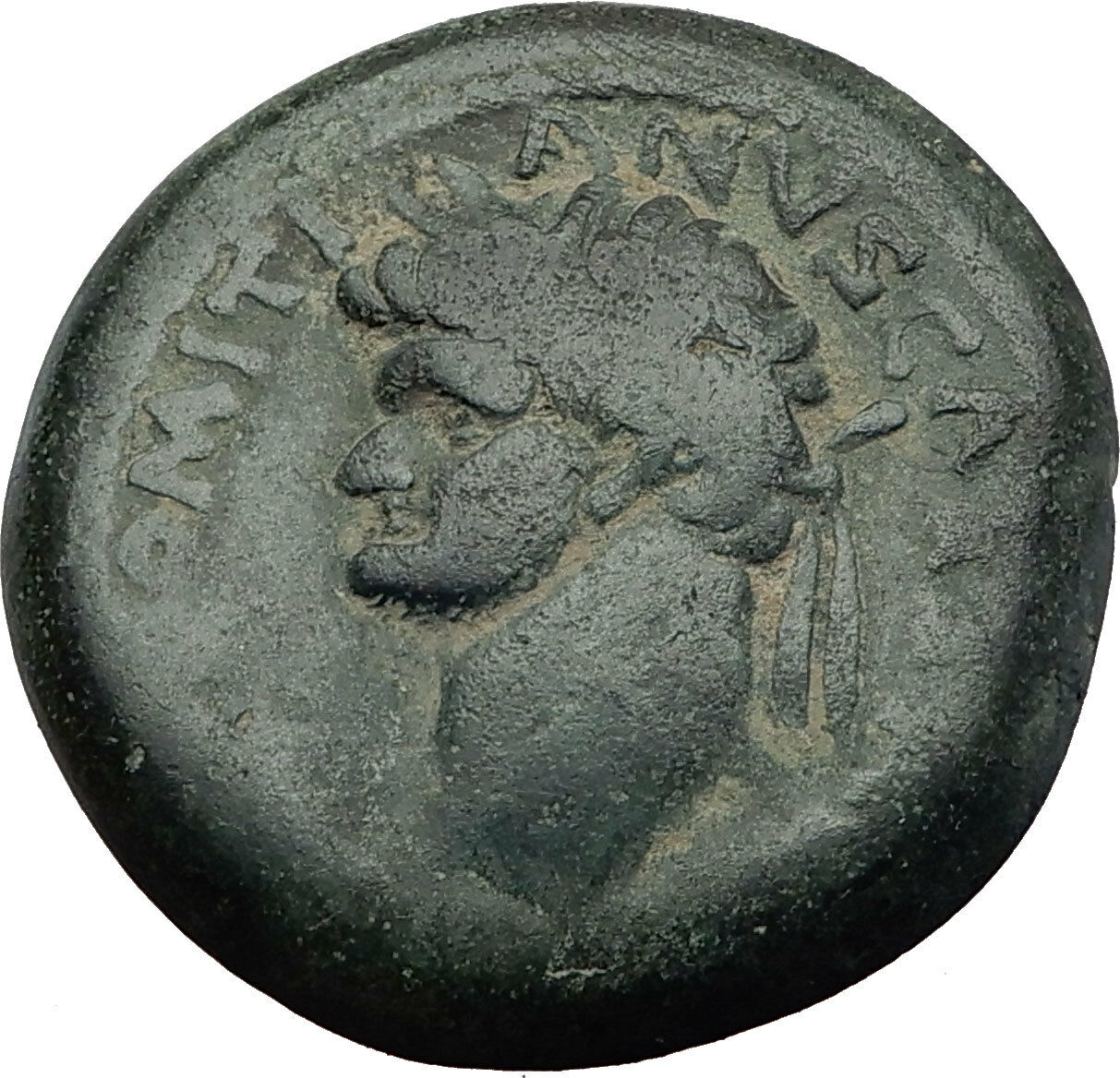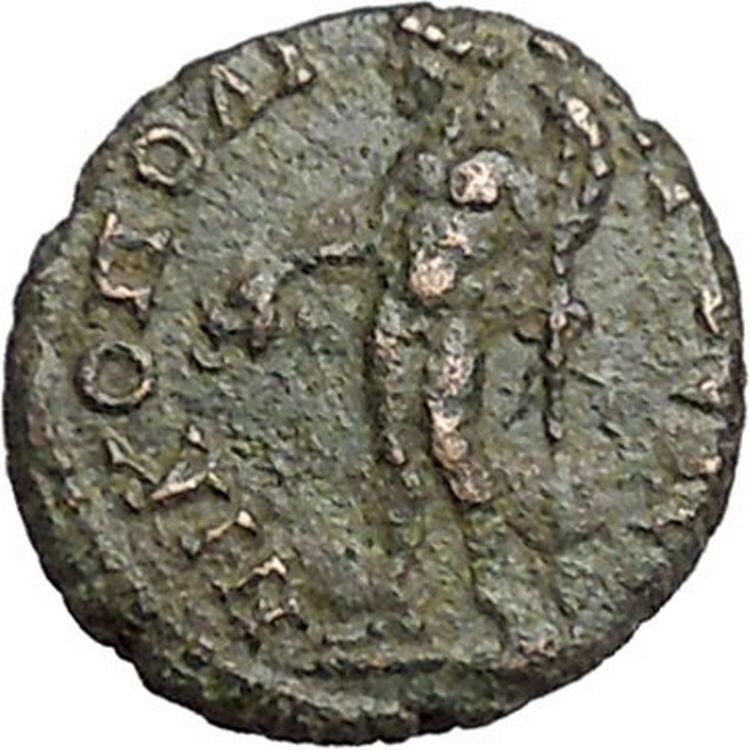|
Gordian III
–
Roman Emperor
: 238-244 A.D. –
Gordian III &
Tranquillina
Bronze 31mm (21.54 GRAMS) of
MESOPOTAMIA
,
Singara
Reference: SNG Copenhagen 256; BMC 8-11
ΑΥΤΟ Κ Μ ΑΝΤ ΓΟΡΔΙΑΝΟΣ ΣΑΒ ΤΡΑΝΚΥΛΛΙΝΑ ΣΕΒ, Confronted busts of Gordian right,
laureate, draped, and cuirassed, and Tranquillina left, draped and wearing
stephane.
ΑΥΡ ΣΕΠ ΚΟΛ ΣΙΝΓΑΡΑ, Tyche seated left on rocks, holding branch; above, centaur
(Sagittarius) leaping left, shooting bow; to lower left, half-length figure of
river-god Mygdonius swimming left.
You are bidding on the exact
item pictured, provided with a Certificate of Authenticity and Lifetime
Guarantee of Authenticity.
Singara (Greek:
τὰ Σίγγαρα) was a strongly fortified post
at the northern extremity of
Mesopotamia
, which for a while, as appears from
coins found, was occupied by the
Romans
as an advanced colony against the
Persians
. It was the camp of
Parthica I legio
.
Its position, south-east of
Nisibis
, has not been clearly defined by
ancient writers,
Stephanus of Byzantium
calling it a city of
Arabia
, near
Edessa
, and
Ptolemy
placing it on the
Tigris
. There can, however, be no doubt that it
and the mountain near it, called by Ptolemy ὸ
Σίγγαρας ὄρος, are represented at the present day by the district of the
Singar
(in modern-day
Iraq).
It was first taken by the Romans during
Trajan
‘s eastern campaigns, when general
Lusius Quietus
captured the city without a
fight in the winter of 114; Although it was abandoned following the Roman
withdrawal from
Mesopotamia
in 117, the city became once again
part of the Roman Empire with the
Parthian
campaign of
Septimius Severus
in 197. The city was raised
by Severus to the status of a
Roman colony
, as is attested by the legend
found on some of the coins minted there during the reign of
Gordian III
:
ΑΥΡ. CΕΠ. ΚΟΛ. CΙΝΓΑΡΑ., which is Greek script for the city’s Latin name,
Aurelia Septimia Colonia Singara. It remained one of the easternmost
outposts of the Roman Empire throughout the 3rd century. It was the scene of a
celebrated nocturnal conflict during a
siege
of the city in 344 by
Sassanid
King
Shapur II
, the result of which was so
unsatisfactory that both sides claimed the victory.) Still later, in 359/360,
during the reign of
Constantius II
, it is recorded that it
underwent a celebrated siege, and at length was carried by the Persians by
storm, though gallantly defended by the townspeople and two legions. The country
around it is stated by
Ammianus Marcellinus
and
Theophylact Simocatta
to have been extremely
arid, which rendered it equally difficult to take or to relieve from a distance.
Tyche (Greek for luck; the Roman equivalent was
Fortuna
) was the presiding
tutelary deity
that governed the fortune and
prosperity of a city, its destiny. Increasingly during the Hellenistic period,
cities had their own specific iconic version of Tyche, wearing a
mural crown
(a crown like the walls of the
city).

The
Greek historian Polybius
believed that when no cause can be
discovered to events such as floods, droughts, frosts or even in politics, then
the cause of these events may be fairly attributed to Tyche.
Stylianos Spyridakis concisely expressed Tyche’s appeal in a Hellenistic
world of arbitrary violence and unmeaning reverses: “In the turbulent years of
the Epigoni of Alexander
, an awareness of the
instability of human affairs led people to believe that Tyche, the blind
mistress of Fortune, governed mankind with an inconstancy which explained the
vicissitudes of the time.”
In literature, she might be given various genealogies, as a daughter of
Hermes
and
Aphrodite
, or considered as one of the
Oceanids
, daughters of
Oceanus
and
Tethys
, or of
Zeus. She was connected with
Nemesis
and
Agathos Daimon
(“good spirit”).
She was uniquely venerated at
Itanos
in Crete, as Tyche Protogeneia,
linked with the Athenian
Protogeneia
(“firstborn”), daughter of
Erechtheus
, whose self-sacrifice saved the
city.
She had temples at
Caesarea Maritima
,
Antioch
,
Alexandria
and
Constantinople
. In
Alexandria
the Tychaeon, the temple of
Tyche, was described by
Libanius
as one of the most magnificent of the
entire Hellenistic world.
Tyche appears on many
coins
of the Hellenistic period in the three
centuries before the Christian era, especially from cities in the Aegean.
Unpredictable turns of fortune drive the complicated plotlines of
Hellenistic romances
, such as
Leucippe and Clitophon
or
Daphnis and Chloe
. She experienced a
resurgence in another era of uneasy change, the final days of publicly
sanctioned
Paganism
, between the late-fourth-century
emperors
Julian
and
Theodosius I
who definitively closed the
temples. The effectiveness of her capricious power even achieved respectability
in philosophical circles during that generation, though among poets it was a
commonplace to revile her for a fickle harlot.
In medieval art
, she was depicted as carrying a
cornucopia
, an
emblematic
ship’s rudder, and the
wheel of fortune
, or she may stand on the
wheel, presiding over the entire circle of fate.
The constellation of
Virgo
is sometimes identified as the heavenly
figure of Tyche, as well as other goddesses such as
Demeter
and
Astraea
.
Furia Sabinia Tranquillina or Sabinia Tranquillina (ca 225 –
aft. 244) was the
Empress of Rome
and wife of Emperor
Gordian III
. She was the young daughter of the
Praetorian
Prefect
Timesitheus
by an unknown wife.
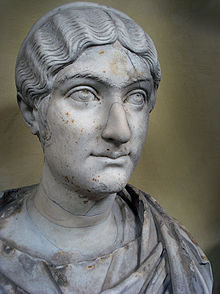
In
241 her father was appointed the head of the Praetorian Guard by the Roman
Emperor Gordian III
. In May that year, Tranquillina had
married Gordian. She became a Roman Empress and received the honorific title of
Augusta. Her marriage to Gordian was an admission by the young emperor of
both political indispensability of Timesitheus and Tranquillina’s suitability as
an empress.
In 243, Tranquillina’s father suddenly died and was replaced with
Philip the Arab
, as head of the
Praetorian Guard
. When Gordian was killed in
February 244, Philip became the new emperor. Tranquillina survived her husband.
She had no sons with him. Christian Settipani suggests that they had a daughter,
(Furia) (b. ca 244), most likely posthumous, who married (Marcus Maecius Orfitus)
(b. ca 245), son of Marcus Maecius Probus (b. ca 220), married to Pupiena Sextia
Paulina Cethegilla (b. ca 225), paternal grandson of
Marcus Pomponius Maecius Probus
and maternal
grandson of
Marcus Pupienus Africanus
(son of his protector
Emperor
Pupienus Maximus
) and wife Cornelia Marullina,
by whom she had issue.
Marcus Antonius Gordianus Pius (January
20, 225
–
February
11
, 244
),
known in
English
as Gordian III,
 was was
Roman
Emperor
from 238 to 244. Gordian was the son of
Antonia Gordiana
and his father was an unnamed Roman Senator who died before
238. Antonia Gordiana was the daughter of Emperor
Gordian I
and younger sister of Emperor
Gordian II
.
Very little is known on his early life before becoming Roman Emperor. Gordian
had assumed the name of his maternal grandfather in 238.
Following the murder of emperor
Alexander Severus
in Moguntiacum (modern
Mainz
), the
capital of the
Roman province
Germania Inferior
,
Maximinus Thrax
was acclaimed emperor, despite strong opposition of the
Roman senate
and the majority of the population. In response to what was
considered in Rome as a rebellion, Gordian’s grandfather and uncle, Gordian I
and II, were proclaimed joint emperors in the
Africa Province
. Their revolt was suppressed within a month by Cappellianus,
governor of Numidia
and a loyal supporter of Maximinus Thrax. The elder Gordians died,
but public opinion cherished their memory as peace loving and literate men,
victims of Maximinus’ oppression.
Meanwhile, Maximinus was on the verge of marching on Rome and
the Senate elected
Pupienus
and Balbinus
as joint emperors. These senators were not popular men and the population of
Rome was still shocked by the elder Gordian’s fate, so that the Senate decided
to take the teenager Gordian, rename him Marcus Antonius Gordianus as his
grandfather, and raise him to the rank of
Caesar
and imperial heir.
Pupienus
and Balbinus
defeated Maximinus, mainly due to the defection of several
legions
,
namely the
Parthica II
who assassinated Maximinus. But their joint reign was
doomed from the start with popular riots, military discontent and even an
enormous fire that consumed Rome in June 238. On
July 29
,
Pupienus and Balbinus were killed by the
Praetorian guard
and Gordian proclaimed sole emperor.
Rule
Due to Gordian’s age, the imperial government was surrendered
to the aristocratic families, who controlled the affairs of Rome through the
senate. In 240,
Sabinianus
revolted in the African province, but the situation was dealt quickly. In 241,
Gordian was married to Furia Sabinia
Tranquillina
, daughter of the newly appointed praetorian prefect,
Timesitheus
. As chief of the Praetorian guard and father in law of the
emperor, Timesitheus quickly became the de facto ruler of the Roman
empire.
In the 3rd century, the Roman frontiers weakened against the
Germanic tribes across the
Rhine
and
Danube
, and the
Sassanid
kingdom across the
Euphrates
increased its own attacks. When the Persians under
Shapur I
invaded Mesopotamia
, the young emperor opened the doors of the
Temple of Janus
for the last time in Roman history, and sent a huge army to
the East. The Sassanids were driven back over the Euphrates and defeated in the
Battle of Resaena
(243). The campaign was a success and Gordian, who had
joined the army, was planning an invasion of the enemy’s territory, when his
father-in-law died in unclear circumstances. Without Timesitheus, the campaign,
and the emperor’s security, were at risk.
Marcus Julius Philippus, also known as
Philip the Arab
, stepped in at this moment as the new Praetorian Prefect and
the campaign proceeded. In the beginning of 244, the Persians counter-attacked.
Persian sources claim that a battle was fought (Battle
of Misiche) near modern
Fallujah
(Iraq)
and resulted in a major Roman defeat and the death of Gordian III[1].
Roman sources do not mention this battle and suggest that Gordian died far away,
upstream of the Euphrates. Although ancient sources often described Philip, who
succeeded Gordian as emperor, as having murdered Gordian at Zaitha (Qalat es
Salihiyah), the cause of Gordian’s death is unknown.
Gordian’s youth and good nature, along with the deaths of his
grandfather and uncle and his own tragic fate at the hands of another usurper,
granted him the everlasting esteem of the Romans. Despite the opposition of the
new emperor, Gordian was deified by the Senate after his death, in order to
appease the population and avoid riots.
|







 was
was